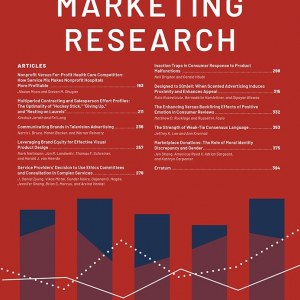
Steenkamp, J., \de Jong\, M. and Baumgartner, H. (2010). Socially Desirable Response Tendencies in Survey Research Journal of Marketing Research, 47(2):199--214.
-
Affiliated author
-
Publication year2010
-
JournalJournal of Marketing Research
Socially desirable responding (SDR) has been of long-standing interest to the field of marketing. Unfortunately, the construct has not always been well understood by marketing researchers. The authors provide a review of the SDR literature organized around three key issues¿the conceptualization and measurement of SDR; the nomological constellation of personality traits, values, sociodemographics, and cultural factors associated with SDR; and the vexing issue of substance versus style in SDR measures. The authors review the current ¿state of the literature,¿ identify unresolved issues, and provide new empirical evidence to assess the generalizability of existing knowledge, which is disproportionately based on U.S. student samples, to a global context. The new evidence is derived from a large international data set involving 12,424 respondents in 26 countries on four continents.